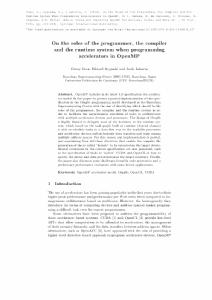Mostra el registre d'ítem simple
On the roles of the programmer, the compiler and the runtime system when programming accelerators in OpenMP
| dc.contributor.author | Ozen, Guray |
| dc.contributor.author | Ayguadé Parra, Eduard |
| dc.contributor.author | Labarta Mancho, Jesús José |
| dc.contributor.other | Universitat Politècnica de Catalunya. Departament d'Arquitectura de Computadors |
| dc.date.accessioned | 2015-05-11T18:16:46Z |
| dc.date.available | 2016-05-11T00:30:46Z |
| dc.date.created | 2014 |
| dc.date.issued | 2014 |
| dc.identifier.citation | Ozen, G.; Ayguade, E.; Labarta, J. On the roles of the programmer, the compiler and the runtime system when programming accelerators in OpenMP. A: International Workshop on OpenMP. "Using and Improving OpenMP for Devices, Tasks, and More 10th International Workshop on OpenMP, IWOMP 2014 Salvador, Brazil, September 28-30, 2014: proceedings". Salvador: Springer, 2014, p. 215-229. |
| dc.identifier.isbn | 978-3-319-11453-8 |
| dc.identifier.uri | http://hdl.handle.net/2117/27886 |
| dc.description.abstract | OpenMP includes in its latest 4.0 specification the accelerator model. In this paper we present a partial implementation of this specification in the OmpSs programming model developed at the Barcelona Supercomputing Center with the aim of identifying which should be the roles of the programmer, the compiler and the runtime system in order to facilitate the asynchronous execution of tasks in architectures with multiple accelerator devices and processors. The design of OmpSs is highly biassed to delegate most of the decisions to the runtime system, which based on the task graph built at runtime (depend clauses) is able to schedule tasks in a data flow way to the available processors and accelerator devices and orchestrate data transfers and reuse among multiple address spaces. For this reason our implementation is partial, just considering from 4.0 those directives that enable the compiler the generation of the so called “kernels” to be executed on the target device. Several extensions to the current specification are also presented, such as the specification of tasks in “native” CUDA and OpenCL or how to specify the device and data privatization in the target construct. Finally, the paper also discusses some challenges found in code generation and a preliminary performance evaluation with some kernel applications. |
| dc.format.extent | 15 p. |
| dc.language.iso | eng |
| dc.publisher | Springer |
| dc.subject | Àrees temàtiques de la UPC::Informàtica::Arquitectura de computadors::Arquitectures paral·leles |
| dc.subject | Àrees temàtiques de la UPC::Informàtica::Programació |
| dc.subject.lcsh | OpenMP |
| dc.subject.lcsh | Parallel programming (Computer science) |
| dc.subject.other | OpenMP accelerator model |
| dc.subject.other | OmpSs |
| dc.subject.other | OpenCL |
| dc.subject.other | CUDA |
| dc.title | On the roles of the programmer, the compiler and the runtime system when programming accelerators in OpenMP |
| dc.type | Conference report |
| dc.subject.lemac | OpenMP |
| dc.subject.lemac | Programació en paral·lel (Informàtica) |
| dc.contributor.group | Universitat Politècnica de Catalunya. CAP - Grup de Computació d'Altes Prestacions |
| dc.identifier.doi | 10.1007/978-3-319-11454-5_16 |
| dc.description.peerreviewed | Peer Reviewed |
| dc.relation.publisherversion | http://link.springer.com/chapter/10.1007%2F978-3-319-11454-5_16 |
| dc.rights.access | Open Access |
| local.identifier.drac | 15626183 |
| dc.description.version | Postprint (author’s final draft) |
| local.citation.author | Ozen, G.; Ayguade, E.; Labarta, J. |
| local.citation.contributor | International Workshop on OpenMP |
| local.citation.pubplace | Salvador |
| local.citation.publicationName | Using and Improving OpenMP for Devices, Tasks, and More 10th International Workshop on OpenMP, IWOMP 2014 Salvador, Brazil, September 28-30, 2014: proceedings |
| local.citation.startingPage | 215 |
| local.citation.endingPage | 229 |


